

European Journal of Open, Distance and E-Learning. David Pundak [dpundak@gmail.com], Kinneret College, ORT Braude College [ Nissim Sabag [nsabag@hotufi.net], Elena Trotskovsky [elenatro@braude.ac.il], Ort Braude College, Israel Higher education institutions face conflicting challenges; they must equip students with up‑to‑date knowledge in fields in which knowledge is constantly being renewed, while they also need to guide students to examine reality through broad-based observation and consider different scientific disciplines.
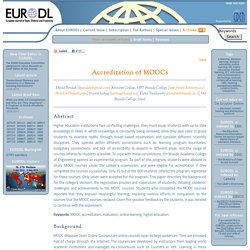
They operate within different constrictions such as: learning program boundaries, budgetary constrictions, and lack of accessibility to experts in different areas, and the range of courses offered to students is limited. To cope with these constrictions, Ort Braude Academic College of Engineering opened an experimental program. As part of this program, students were allowed to study MOOC courses under the college’s supervision, and were eligible for accreditation if they completed the courses successfully. LearningTimes Green Room » Blog Archive » LTGR Ep. #91: “Mother of all MOOCs” (Massive Open Online Courses) 'Open Teaching': When the World Is Welcome in the Online Classroom - Technology. By Marc Parry In his work as a professor, Stephen Downes used to feel that he was helping those who least needed it.
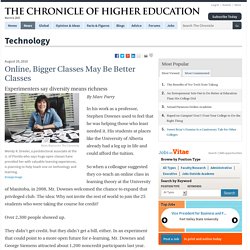
His students at places like the University of Alberta already had a leg up in life and could afford the tuition. So when a colleague suggested they co-teach an online class in learning theory at the University of Manitoba, in 2008, Mr. Downes welcomed the chance to expand that privileged club. The idea: Why not invite the rest of world to join the 25 students who were taking the course for credit?
Over 2,300 people showed up. MOOCs & ISSUES FOR HIGHER EDUCATION by Brian Bottomley on Prezi. The Rising Power of MOOCs Infographic. MOOC Infographics 3 years ago, MOOCs were an idea.
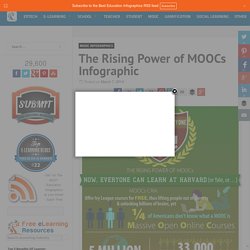
Now 5 million of students have signed on to MOOCs, around the world. Since the first MOOC in 2008, this phenomenon has been spreading amongst very well accredited colleges. The Rising Power of MOOCs Infographic shows the rapid growth of MOOCs which offer free education from everyone presenting their main pros and cons. Exploring the Dark Side of MOOCs Infographic. MOOC Infographics The Exploring the Dark Side of MOOCs Infographic sheds light on higher-education institutions’ opinions about MOOCs, their sustainability, and more.
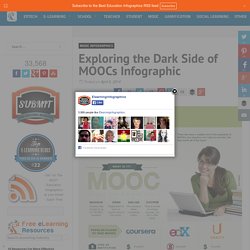
The infographic explores whether or not MOOCs live up to their hype. Administrators’ chief concerns about MOOCs are outlined. Regarding the high number of students taking the courses, critics assert that MOOCs cannot provide the same intimate experience as a traditional classroom. Students are unable to get to know their professors as well as they might have in a physical setting.
Via: www.onlinecolleges.net. Massive Open Online Courses Infographic. MOOC Infographics At the MOOCs Infographic you will find out what is a MOOC, the major MOOC providers, course offered, user demographics, and more interesting MOOC in-signs!
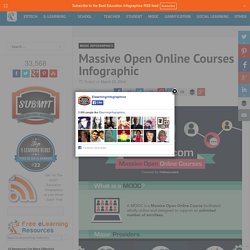
Via: moocs.com Embed This Education Infographic on your Site or Blog! Copy and Paste the following code! Massive Open Online Course (MOOC) What Is a MOOC? A massive open online course (MOOC) is a model for delivering learning content online to any person who wants to take a course, with no limit on attendance. This updated ELI 7 Things You Should Know About MOOCs II (June 2013) provides additional key facts about MOOCs. A short video about MOOCs and the connected age. What is a MOOC? Anant Agarwal: Why massively open online courses (still) matter. MOOC_Final.pdf. What is a MOOC? What is a MOOC? ELI7097.pdf. What is a MOOC? - MOOC (Massive Open Online Course) The MOOCs have just born and, therefore, are in a process of transformation and settlement and nobody can categorically say what a MOOC is.
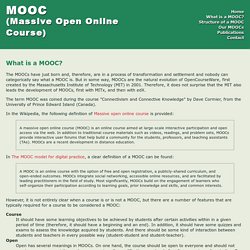
But in some way, MOOCs are the natural evolution of OpenCourseWare, first created by the Massachusetts Institute of Technology (MIT) in 2001. Therefore, it does not surprise that the MIT also leads the development of MOOCs, first with MITx, and then with edX. The term MOOC was coined during the course "Connectivism and Connective Knowledge" by Dave Cormier, from the University of Prince Edward Island (Canada). “YouTube for MOOCs” reinvents how online learners watch videos. What 7 million clicks tell us about how to fix online educationA "YouTube for MOOCs," LectureScape re-invents the video-watching experience The rise of online education and massively open online courses (MOOCs) have prompted much naysaying on their effectiveness, with detractors citing single-digit completion rates and short-lived pilot programs.
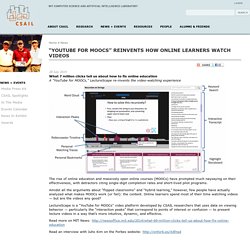
Amidst all the arguments about “flipped classrooms” and “hybrid learning,” however, few people have actually analyzed what makes MOOCs work (or fail): the content. Online learners spend most of their time watching videos — but are the videos any good? LectureScape is a “YouTube for MOOCs” video platform developed by CSAIL researchers that uses data on viewing behavior — particularly the “interaction peaks” that correspond to points of interest or confusion — to present lecture videos in a way that’s more intuitive, dynamic, and effective. Read more on MIT News: Read an interview with Juho Kim on the Forbes website: MOOCs_Expectations_and_Reality.pdf. 5 MOOCs Teachers Should Take As Students.
For a while there, the word “MOOC” seemed to be on everyone’s tongue.
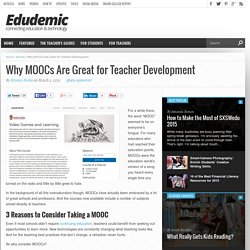
For many educators who had reached their saturation points, MOOCs were the education world’s version of a song you heard every single time you turned on the radio and little by little grew to hate. In the background of all this oversaturation though, MOOCs have actually been embraced by a lot of great schools and professors. And the courses now available include a number of subjects aimed directly at teachers. 3 Reasons to Consider Taking a MOOC Even if most schools didn’t require continuing education, teachers could benefit from seeking out opportunities to learn more. Five myths about Moocs. Diana Laurillard explains why a model based on unsupervised learning is not the answer Source: Dale Edwin Murray.
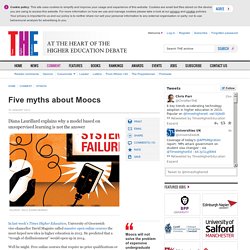
Diana Laurillard. MOOCS: The new higher education? On September 19, Slate Magazine concluded “Online Higher-Education Startup Coursera Is Taking Over the World.”
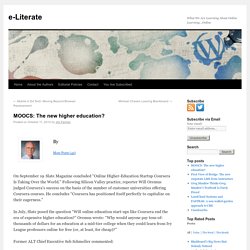
Following Silicon Valley practice, reporter Will Oremus judged Coursera’s success on the basis of the number of customer universities offering Coursera courses. He concludes “Coursera has positioned itself perfectly to capitalize on their eagerness.” Introduction. The University of Edinburgh offers a range of Massive Open Online Courses (MOOCs).
What are MOOCs? MOOCs are short courses that are delivered online for free. These courses: do not have any entry requirements - all courses can be taken by anyone from anywhere onlineare usually run two or three times each yearare led by world-class academics and supported by teaching assistantstypically require 1-2 hours of study each week for around 5 weeksare self-directed, meaning you follow the course materials, complete the readings and assessments, and get help from a large community of fellow learners through online forumsare comparable to a standard University of Edinburgh course in terms of content and study levelmeet high academic standards and are subject to internal quality assurance processes.
Daphne Koller: What we're learning from online education. What is a MOOC? 5 Myths About Open Online Courses at Scale. Free Online Course Materials. Find Thousands of FREE Online Courses: OpenCourseWare. Coursera - Free Online Courses From Top Universities. Welcome to Forbes. Why MOOCs are Failing the People They're Supposed to Help - The New Yorker. On July 23rd, 1969, Geoffrey Crowther addressed the inaugural meeting of the Open University, a British institution that had just been created to provide an alternative to traditional higher education. Courses would be conducted by mail and live radio. The basic mission, Crowther declared, was a simple one: to be open to people from all walks of life. “The first, and most urgent task before us is to cater for the many thousands of people, fully capable of a higher education, who, for one reason or another, do not get it, or do not get as much of it as they can turn to advantage, or as they discover, sometimes too late, that they need,” he told his audience.
“Men and women drop out through failures in the system,” he continued, “through disadvantages of their environment, through mistakes of their own judgment, through sheer bad luck. Learning with New Media. Failure, noun: “The fact of failing to effect one’s purpose” (Oxford English Dictionary, failure, n. 3a) Diana Laurillard. Five myths about Moocs. MOOCs Aren’t Revolutionizing College, but They’re Not a Failure. A few years ago, the most enthusiastic advocates of MOOCs believed that these “massive open online courses” stood poised to overturn the century-old model of higher education. Their interactive technology promised to deliver top-tier teaching from institutions like Harvard, Stanford, and MIT, not just to a few hundred students in a lecture hall on ivy-draped campuses, but free via the Internet to thousands or even millions around the world.
At long last, there appeared to be a solution to the problem of “scaling up” higher education: if it were delivered more efficiently, the relentless cost increases might finally be rolled back. 25 Killer Sites For Free Online Education.